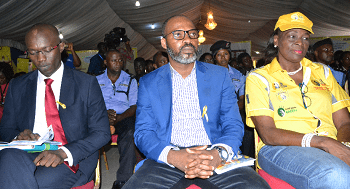– As LWI holds GHB 2107 in grand style
An expert in social and behavioural sciences from Harvard T.H. Chan School of Public Health, Boston, Massachusetts, Dr Vaughan Rees, has urged the federal government to further educate tobacco consumers in the country on the health consequences, addictive nature and mortal threats posed by tobacco use.
Dr Rees, who is the director of Centre for Global Tobacco Control Research, made the call while delivering his keynote address at the recently concluded seventh edition of the Grand Health Bazaar (GHB), a three-day, cross-cutting, multisectoral health exposition, organised by Livewell Initiative (LWI), at Havilah Event Centre, Victoria Island.
According to Rees, there is an urgent need to reduce tobacco consumption in the country, as the intake of the stimulant has caused a lot of harm to the health of many of the users, saying they all pay for it one way or the other.
Tobacco, he says, perpetuates poverty and impedes economic development, adding that each smoker eventually loses 13 to 14 years of his or her life.
“Tobacco epidemic is on the rise in low/middle-income countries, and globally, members of poorer communities have highest smoking rates,” Rees said.
Speaking further, the university don, quoting a report by the American Cancer Society, warned that without urgent action to prevent tobacco use, Africa, with its soaring rates of tobacco use and related disease and death, might soon be the future epicentre of the tobacco epidemic.
Rees said smoking is responsible for 30 to 45 per cent of deaths due to heart disease. He added that “smoking is linked to most cancers. It is responsible for 85 to 90 percent of lung cancer cases; 70 to 80 percent of oesophageal cancer cases; as well as for half the cases of bladder cancer and larynx/pharynx cancer cases.
“Every year more than 17,500 Nigerians are killed by tobacco-caused diseases, 207 men and 130 women are killed by tobacco every week. Preventable, premature deaths that shorten lifespan impose hardship and suffering on families, communities.
“The economic cost of tobacco consumption in Nigeria varies among people of low, middle and high-income earnings. Even though the poor are affected the most, the rich also cry because of the way their young and under-aged children are lured into smoking through sophisticated advertising, pop concert and promotion of cigarettes sales and marketing by the tobacco companies.”
Speaking on the implication of not acting on time to curb the tobacco menace, Rees said that of all children alive today, almost one hundred million will be killed by tobacco, adding that there will be continued rise in cancer and heart disease in developing countries, with severely hampered socioeconomic growth and human development.
Speaking at the event, the organiser and chief executive officer of Livewell Initiative (LWI), Pharm. Bisi Bright, said the event, which was designed to promote commerce and industry in different segments of the health sector, as well as bringing together corporates and individuals in a multi-mixed setting under the fulcrum of healthcare.
She pointed out that the theme: “Creating shared value as an essential tool for enhanced corporate sustainability,” had succeeded in bringing high-profile keynote speakers from different organisations, including the prestigious Harvard University, and they had been able to enlighten and update attendees on new innovations in their various fields.
The objective of the programme, Bright said, was to bring the corporate world to a point where it would reflectively look at healthcare from another perspective, as against the common belief that healthcare was only about falling sick, which is curative health care. She explained that there are other aspects of healthcare, such as promotive healthcare.
“We found out that most of the corporate people are health insured and as a result, there is tendency for them not to look for healthcare except when they are sick and we also discovered that if we offer free healthcare to a corporate person, he or she may not want to be seen as being poor or struggling with the common people to get healthcare,” she said. “So we thought we could do it in an atmosphere that will be attractive to them. It means bringing the corporate world together under the forum of commerce, trade and investment and the bottom line is still health, she said.”
Bright expressed satisfaction with the recent partnership agreement that the LWI entered into with Harvard T.H. Chan School of Public Health, noting that the partnership had further added credibility to the operation of the organisation.
Among other personalities at the event were, Dr Muntaqa Umar-Sadiq, chief executive officer, Private Sector Health Alliance of Nigeria, represented by Mr Babatunde Johnson; Mr Chidi Okoro, chief executive officer, UAC Foods Nigeria Limited, chief guest of honour, represented by Mr Emeka Uchenna; Mr Adetunji Lamidi, FCMB, Microfinance; Mr Jide Adamolekun, Konga.com; Dr Sola Sowemimo, NPF; News Editor Guardian Newspapers; Mr Marcel Mbamalu; and Dr Femi Olugbile, former permanent secretary, LSMOH.











